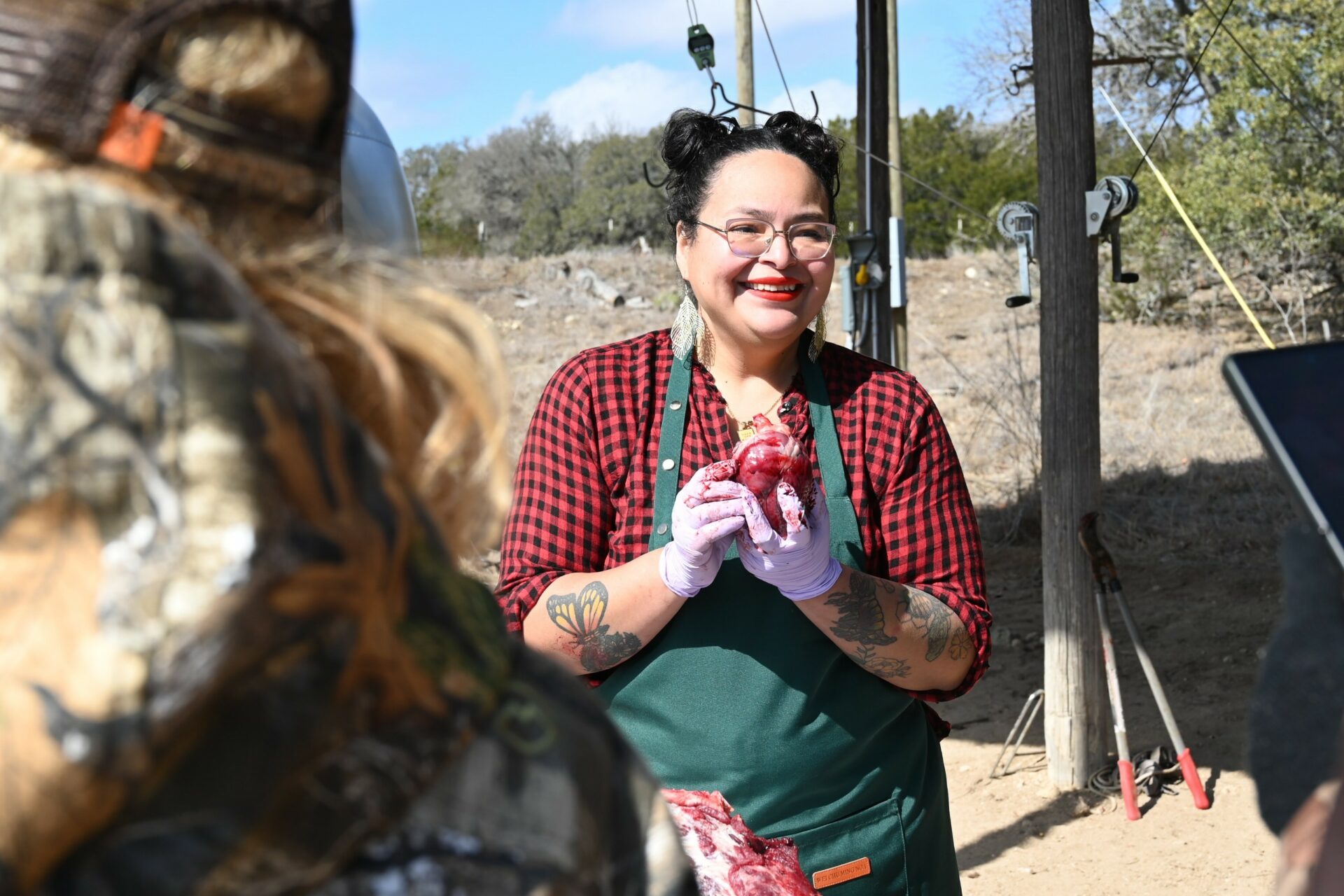We caught up with the brilliant and insightful Kriss-Abigail Paredes a few weeks ago and have shared our conversation below.
Hi Kriss-Abigail, thanks for sharing your insights with our community today. Part of your success, no doubt, is due to your work ethic and so we’d love if you could open up about where you got your work ethic from?
I’m about 4 years old and my father is lifting me up to sit in a windowsill. We’ve come to the telephone factory to bring my mother dinner. Chinese food in white take out containers. A simple memory, more emotional than visual, maybe the facts aren’t quite right but it imprinted something in me. Something that linked what must be done, to what work looks like, to the importance of family.
Up until this point, my mother was my constant companion. I only knew her as my safe place, she was MY Mami.. But she was never only that, she is the daughter of a single mom, my grandmother who was an entrepreneur in the 50’s in El Salvador. Mama Tila (my grandmother) owned homes and her own business. For my mother there was no choice but to preserve and succeed.
My Mother didn’t know English while she was making telephone wires in Chicago, but she knew that the United States of America was the land of opportunity. And she took every single one. She and my Father went to night school to learn the language, watched PBS and Family Feud to learn the culture. We moved about every 2 years into bigger apartments, nicer neighborhoods, better schools. Along the way, watching my parents continually overcome.
By the time the 1980’s Salvadoran Civil War was over in the early 90’s, we were living the American Dream. My parents had gotten their opportunity in real estate and never looked back. They hustled individually and together to build careers, establish investment properties, and open their own brokerage. My sister took over the family business, made it her own, and is now living her own version of the dream.
I often wonder who I would be if the War had never forced us out. If I was still living in a tropical paradise. Of one thing, I have no doubt, my parents would never let our circumstances dictate our future.
Thanks, so before we move on maybe you can share a bit more about yourself?
I’m an urban kid from Chicago, a professional photographer who one day found myself in rural Texas with a knife in my hand. When I answered a Craigslist Ad for “game processing”, I had no idea what this next chapter of my life would hold. Hunting and consuming wild game meat were far outside of my lived experience at the time. During that first season at a custom processor, I was acutely aware of how disconnected I had been from my food sources. Now, I could never escape the fact that I was cutting up an animal to turn into food. I was confronted with my own cultural biases about what hunting represented and what stewardship could also be.
Curious by nature with a love of stories, I appreciate the tales of these wild animals and a human purpose. It gives me a sense of responsibility to honor the hunted and the hunter. The more I learned of our food sources, the more I turned death into sustenance, the more passionate I became about sharing my knowledge. Hunting is conservation, a phrase often said by outdoorsfolk, became my soap box. I started posting images of my work on my social media under the hashtag Meet Your Meat to share the journey with my friends. When the pandemic hit and our food sources where hit, hunting licenses were issued more than ever and people turned to home gardens to nourish their families. That’s when my purpose in butchery education met my passion for food sovereignty. Over the last two years, I have produced pop-up dinners, given educational butchery demonstrations, done public speaking on the subject, and had my first hunt.
As of this interview, I’m about to enter my 8th hunting season as a custom processor. I also have some personal hunts lined up in addition to more opportunities to educate others. I’m looking forward to learning more about it all and filling my life with wild experiences.
There is so much advice out there about all the different skills and qualities folks need to develop in order to succeed in today’s highly competitive environment and often it can feel overwhelming. So, if we had to break it down to just the three that matter most, which three skills or qualities would you focus on?
A love of failure. We are often taught that perfection is the goal, but not that the journey is fraught with failure. And it is the love of failure that propels us towards success. The more you allow yourself to find out, the more curious you become about the what-ifs, the more you’re willing to bet on yourself, the more you’ll create a life that is truly yours. It’s okay to try something and for it to not go as planned, because the whole point is to learn, to not make the same mistake twice, but to forgive yourself when you do. Fall down 7, get up 8 is something I often repeat to myself. I find it helpful when I’m teaching butchery to give someone a task where they are allowed to mess-up. When inevitably a mistake is made, we all learn how to navigate it together. In work and in life, giving yourself and others a safe place to mess up with compassion is a good measure of success.
Repetition. Just do it over. And over. And over. Ad nauseam. To develop a mastery of any skill, you must first start the very beginning. To sharpen a knife consistently, you must first dull a lot of knives, which I definitely did. When I first entered into a processing room, I had never butchered a thing and it shined bright. A spotlight on just how bad I was at this work. It wasn’t until year 4, that I felt confident enough to say that I didn’t know enough. So I kept on practicing, kept on learning what worked, what didn’t, and why. Every animal was an opportunity to hone my skills, to learn from my mistakes, and to meditate on the importance of the work. I became good at my job and in turn my job gifted me with purpose.
Teach others. When you learn, turn around and teach. The best thing you can do to be a master of your craft is to give away your knowledge. It will allow you to stay in touch with all the points of your journey from novice to professional. Teaching requires you to be able to speak and demonstrate what you do in a way the empowers others to able to do it. It’s a breakdown of what you know and every time to you teach others, you are fine-tuning yourself. I love teaching folks that have never butchered before, because I remember what that was like and I will guide them like how I would have wanted to be taught. Stay learning, it will make you better at your work. Stay humble, yours is not the only way nor it should be. Stay open, you never what you’ll learn about yourself when you mentor others.
Okay, so before we go we always love to ask if you are looking for folks to partner or collaborate with?
I’m a big believer in collaboration. I enjoy putting together something that everyone involved feels empowered and represented by. I work towards hunting as conservation, bringing more BIPOC, Women and all interested folks into the outdoors and into food sovereignty. From pop-up dinners with butchery demonstrations, to private butchery classes, to public speaking about my work, I love to uplift my passions and connect with others. I would love to hear from folks wanting to work together and/or create something together. You can connect with me on my website: MeetYourMeat.net.
Contact Info:
- Website: MeetYourMeat.net
- Instagram: Kriss_abigail








Image Credits
Marisa Klug Morataya Kristen Brooke Parma Kriss Abigail




